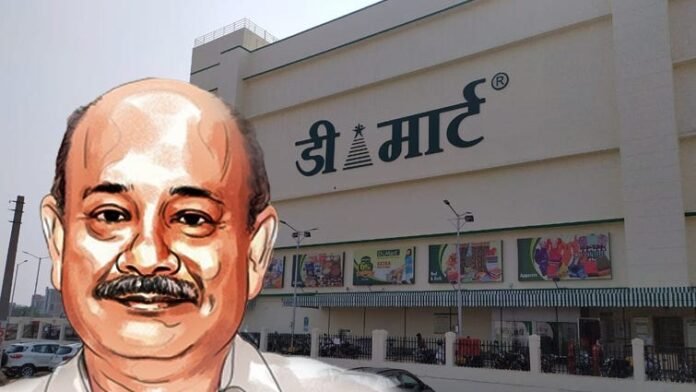Radhakishan Shivkishan Damani, popularly known as RK Damani, is a billionaire investor and the founder of DMart (Avenue Supermarts Limited). He is one of India’s most successful entrepreneurs, also owning Bright Star Investments Limited, an investment firm through which he manages the Damani Portfolio. As of 2021, he was ranked as the 98th richest person in the world by Bloomberg Billionaire Index.
Born in a Maheshwari Marwari family in Bikaner, Rajasthan, Damani did not grow up in a wealthy environment. His family lived in a humble single-bedroom apartment in Mumbai, where his father worked on Dalal Street. Despite these modest beginnings, Damani’s journey from Bikaner to becoming a business magnate is a testament to his hard work and vision.
Damani’s studied commerce at the University of Mumbai but dropped out after his first year to join his father’s ball-bearing business. Following his father’s death, Damani developed an interest in stock market trading, starting his career as a stockbroker. Realizing that he needed to invest his own money to succeed in the stock market, he began investing in stocks in 1980, eventually making a name for himself through short-selling during the 1990s.
How was DMart Founded?
After a successful stint in stock market trading and investing in consumer retail organizations, Damani decided to venture into the retail industry himself. In 1999, he took up a franchise of a cooperative department store called Apna Bazaar in Nerul but found its business model unconvincing. This experience led him to establish his chain of hypermarkets, DMart, starting with a small store in Powai in 2002.
At a time when the retail industry was seeing many new entrants like Subhiksha and Big Bazaar, DMart adopted a unique approach by owning the land on which its stores operated. This strategy allowed DMart to reduce overhead costs and stick to its ‘High Volume-Low Margin’ principle, buying products in bulk at low prices and selling them at competitive rates. DMart’s focus remained on its core business of food and grocery, avoiding diversification into other markets.
Growth of DMart
DMart’s unique business model of owning its stores helped it expand steadily. For the first 15 years, DMart operated its stores only in four states. After going public in 2017, it rapidly expanded to 11 states across India, establishing over 306 stores. The secrets behind DMart’s success include:
- Pricing: DMart’s ‘High-Volume Low-Margin’ business model sets it apart from competitors and builds a strong bond with customers.
- Product Quality: DMart sources products only from reputable suppliers, ensuring high quality.
- Customer Service: DMart’s staff provides knowledgeable and friendly assistance, enhancing the shopping experience.
- Location: Extensive research is done before opening each store, choosing locations near residential areas with low traffic for customer convenience.
- Product Range: DMart offers a variety of products, including food, clothing, and household items, catering to changing consumer demands.
Impact and Awards
DMart has significantly impacted the Indian retail industry by providing high-quality products at affordable prices. Its store-ownership model and efficient inventory management have contributed to its success. DMart’s IPO as Avenue Supermarts Ltd. in 2017 was a landmark event, achieving a valuation of $39,988 crore. By November 2019, it was ranked 33rd on the BSE’s list of organizations with a market capitalization of $114,000 crore. In 2023, Radhakishan Damani was listed among the top names in IDFC FIRST Private Hurun India’s Top 200 Self-made Entrepreneurs of the Millennia, along with other notable personalities.
Towards Success and Beyond
The secret behind DMart’s success lies in its customer-centric approach. Radhakishan Damani has achieved his vision of building India’s biggest retail chain by sticking to the core principles of providing quality products at low prices. This strategy, combined with a focus on efficient store management and customer service, has allowed DMart to delight customers consistently.
As DMart continues to grow, its commitment to these principles ensures that it remains a leader in the Indian retail industry. Damani’s journey from a modest upbringing in Bikaner to becoming a business magnate is an inspiring story of vision, perseverance, and strategic thinking.
Frequently Asked Questions
What is the full form of DMart?
DMart stands for Damani Mart, named after its founder Radhakishan Damani. It is a popular retail chain in India known for its affordable prices and wide range of products.
Who is the DMart owner in India?
Radhakishan Damani is the founder and owner of DMart. He is one of India’s wealthiest individuals, known for his successful retail venture and astute business acumen.
What are the three pillars of DMart?
The three pillars of DMart are “Everyday Low Prices,” “Wide Range of Products,” and “Uncompromising Quality.” These principles form the foundation of DMart’s business model, ensuring value, variety, and quality for customers.
What is the income of DMart per day?
In 2022, DMart reported a profit of INR 1.6 crore per day, with a total profit of Rs. 589 crores for the year. For the most accurate and up-to-date information on DMart’s daily income, refer to the latest financial reports or news sources.
Radhakishan Damani’s journey and the success of DMart serve as a remarkable example of how strategic business practices and a customer-focused approach can lead to significant achievements in the retail industry.


